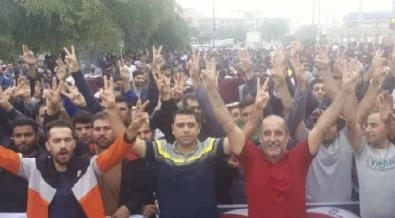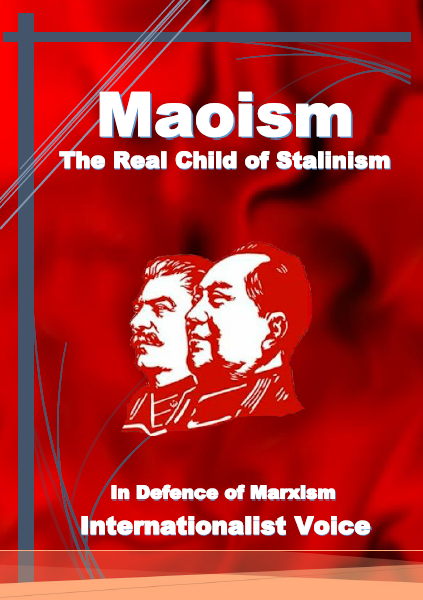Lessons from the Protests and Strikes in the Petrochemical Industries
Different currents and trends in the left of capital had, after the events of the 2011 presidential election, tried to undermine the workers’ class struggle. They sought to take advantage of the situation, and to put the power and potential of the working class into the service of their own bourgeois democratic movement.
The fact is: the democratic movement is separate from the movement of the working class. We have already mentioned that the proletariat must take self initiative and give its imprint on historical events. We wrote:
“In the case of the people’s protests and movements, if the working class dissolves itself in the Democratic and Liberal movements, it will not weaken the bourgeoisie but the proletariat.”
In recent months, with the decline of the democratic movement, the movement of the working class has assumed a more independent form. Class struggle is growing, albeit defensively, and the proletariat begins to play its role in historical development, albeit slowly. In the past six months, despite unbridled suppression, we have witnessed a series of protests and strikes from workers across the country. The most important protests and strikes have occurred in the petrochemical industry.
On February 26th, 2011, ~1400 contract workers at the Tabriz Petrochemical Complex went on strike in protest of the “temporary contract.” The strikers demanded “direct and collective contract” in order to receive the same benefits and job security provisions as permanently employed workers. When the empty promises of management and government officials failed, management tried to use dirty tricks against workers. They tried to replace the striking workers with other workers, but they refused to comply. The strike lasted eleven days, ending with promises to fulfill the demands of striking workers.
On April 9th, 2011, ~2000 petrochemical workers at the Mahshahr Petrochemical Complex went on strike. The demands of strikers were ratification of direct contracts and cancellation of temporary contracts. This strike was a continuation of their protests from March, 2011, where a strike was prevented through empty promises and use of the coming Iranian New Year (Nowruz) as an excuse for peace. Once the strike started, though, it quickly spread to the whole complex, enveloping thousands of petrochemical workers at the Amir Kabir Petrochemical Industry, Khuzestan, Razi Chemical, Tondguyan, Bouali and Arvand.
In response to striking workers, management proclaimed that implementing workers’ demands was not their responsibility but “removal of contractors should be carried out with a communiqué of the Minister of Oil.” But the workers insisted that they would not end their strike until management agreed to their demands.
Finally, after 10 days, on April 19th, 2011, the Mahshahr workers ended their strike. This came after hours of negotiations with management and government representatives (the governor, the representative of Mahshahr, Labor Department officials, etc.) Management asked the workers to wait three months, so they could take the necessary steps to carry out their demands through the Ministry of Oil. Management also pledged to provide them with the benefits of permanently employed workers previously denied to them. In addition, wages missed during the strike would be paid and workers would not be prosecuted for striking.
Before addressing the achievements, weaknesses, and limitations of these protests, it is essential to consider the contexts of the formation of temporary contracts with the “minimum wage.” After the war and during the presidency of Akbar Rafsanjani, he proclaimed that Iran was going to become a modern, industrialized country, an “Islamic Japan” in his words. How to do this? Through the “manpower adjustment” policy of Sardar Sazandegi, the real meaning of which was widespread layoffs. A large section of the working class was therefore forced to accept temporary contracts in order to survive. From this time onwards, temporary contracts became prevalent in small workshops and large factories and large industries. Contracting companies popped up one after another in all industries and economic institutions. Nader Ghazipour, member of the presidium of the labor fraction of parliament, stated that: “Over 80 percent of workers are under temporary contracts”[1][Our translation]. On the one hand, this has done great damage to the fabric of the working class. On the other hand, it shows the contradiction of the peripheral bourgeoisie. The bourgeoisie needs labor to gain surplus value and accumulate capital. But it struggles to turn a section of the working class into the empty proletariat.
Nightmares of layoffs, lack of job security, intense labor, low salaries, lack of insurance, lack of benefits and so on are the consequences of temporary contracts. All symptomatic of capitalism in crisis, a crisis which deepens and spreads throughout the world. Waves of the crisis go as far as from Iran to Greece, from Egypt to Spain. The bourgeoisie use this crisis as an excuse to attack the living standards of the working class daily, worldwide. In Iran attacks on the living standards of the working class have been ideological and sponsored by the supreme leader Ali Khamenei. He declared the New Year a year of “economic jihad” and urged people to work. “Working is jihad” he added. The real meaning of this “economic jihad” is austerity for the working class.
Actualization of the “economic jihad” was delegated to the Supreme Labor Council, an organization consisting of representatives of employers, government representatives and representatives of the “workers” (these “worker” representatives function through the Islamic Councils – appendages to the Ministry of Intelligence and National Security in the workplace).[2] This “Council” then set out to regulate the minimum wage. According to Article 41 of the Labor Law:
- The minimum wage of workers shall be fixed taking account of the rate of inflation announced by the Central Bank of the Islamic Republic of Iran;
- Regardless of the physical and intellectual abilities of workers and the characteristics of the work assigned, the minimum wage shall be sufficient to meet the living expenses of a family, [sic] whose average number of members shall be specified by the appropriate authorities.
This Labor Law has been formed according to the conventions of the International Labour Organization (ILO). The Supreme Labor Council even raised the minimum wage for a month at a 9% increase. However, with the elimination of subsidies, these wages are below the poverty level. Another consequence of the elimination of subsidies? Rising unemployment as small industries will go bankrupt from high energy costs. Providing basic necessities has become a nightmare for the working class and lower strata of society. And even after all this the labor law does not cover workshops under 10 persons, according to Council member Seyyed Mohammad Yarahmadian.
What does this all mean? It means that workers are not only struggling for a better life but also struggling for basic survival. In their demands for unpaid salaries and official contracts, they are defending the most basic level of livelihoods.
As per usual, the left of capital is still busy with its role as safety valve and trying to restrict the anger and potential of workers. Demands for higher wages to match inflation and the right to organize have been ignored. The left of capital has also demanded the expulsion of the Iranian delegation of the ILO and has arranged protests against their meetings. But against the wishes of the left of capital, this bourgeois institution and thieves’ nest, in its 100th session, elected Iran as a member of it’s board. This has, in practice, shown that bourgeois democracy and bourgeois dictatorship are two sides of the same coin, that both are barbaric and organize the exploitation of the working class.
Under such conditions, protests and strikes in the petrochemical industries show that the working class as a social force has not been defeated. And given the restrictions, those strikes, distinctly the petrochemical strike of Mahshahr, are a tremendous achievement. Especially in the face of the deception from the police and security officials that tried to split the strikers. The spreading role of the strike to other industries, such as Amir Kabir Petrochemical Company, Khuzestan, Tondguyan, Bo Ali and Arvand is also very important.
The reaction of the bourgeoisie against the recent protests and strikes are likewise noteworthy. The bourgeoisie did not try to create another Khatunabad. In Khatunabad on January 24th, 2004 the bourgeoisie spilt the blood of protesting workers. Workers were protesting against their unemployment and demanding a return to work. First they tried to divide the striking workers and then they adopted the policy of isolation and pretended that they did not take the strikers seriously, but with the expansion of the strike, they resorted to the tactic of exhaustion and referred to the legal process. Eventually, they were forced to comply with some of the demands of the striking workers.
The bourgeoisie can inaugurate bloodbath in it’s streets or in it’s dungeons, it has done so many times, but it knows that the workers’ strikes, especially in key industries, are shaking the backbone of the capitalist system. The bourgeoisie has the experiences of 1979 in the back of it’s mind. In this context, the protests and strikes of petrochemical industries have a special place.
Another important characteristic of strikes of petrochemical industries was the reliance on the class power of the working class. Striking workers did not resort to the institutions and organizations of the bourgeois to fulfill their demands, they cut off the process of the accumulation of capital and surplus-value. Certainly these strikes, despite their limitations, will strengthen the confidence of the working class and will strengthen hope to win the upcoming battles.
Strengthening the independence of the ranks of the proletariat; reliance on it’s power as a class; demystifying bourgeois democratic illusions; these are the lessons that should be taken from these battles. Because it is the ghost of class struggle that the bourgeoisie fear most of all, because the class struggle in its evolutionary process will lead to the revolutionary destruction of the capitalist system. We have a world to win and nothing to lose but our chains!
Firoz Akbary
22 June 2011
Notes:
[1] Aftab News Agency on Wednesday, July 21, 2010 (http://www.aftabnews.ir/vsda%5Eln1lkt47,1.k5hk4.html)
[2] https://irandataportal.syr.edu/the-supreme-labor-council














